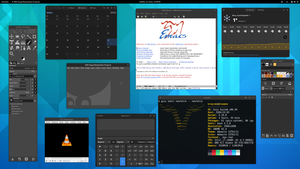It has been suggested that this article be merged into Free and open-source software. (Discuss) Proposed since May 2024. |

Free software, libre software, libreware[1][2] sometimes known as freedom-respecting software is computer software distributed under terms that allow users to run the software for any purpose as well as to study, change, and distribute it and any adapted versions.[3][4][5][6] Free software is a matter of liberty, not price; all users are legally free to do what they want with their copies of a free software (including profiting from them) regardless of how much is paid to obtain the program.[7][2] Computer programs are deemed "free" if they give end-users (not just the developer) ultimate control over the software and, subsequently, over their devices.[5][8]
The right to study and modify a computer program entails that the source code—the preferred format for making changes—be made available to users of that program. While this is often called "access to source code" or "public availability", the Free Software Foundation (FSF) recommends against thinking in those terms,[9] because it might give the impression that users have an obligation (as opposed to a right) to give non-users a copy of the program.
Although the term "free software" had already been used loosely in the past and other permissive software like the Berkeley Software Distribution released in 1978 existed,[10] Richard Stallman is credited with tying it to the sense under discussion and starting the free software movement in 1983, when he launched the GNU Project: a collaborative effort to create a freedom-respecting operating system, and to revive the spirit of cooperation once prevalent among hackers during the early days of computing.[11][12]
- ^ GNU Project. "What is free software?". Free Software Foundation. Archived from the original on Nov 15, 2023.
- ^ a b "Richard Stallman". Internet Hall of Fame. Retrieved 26 March 2017.
- ^ "Free Software Movement". GNU. Retrieved 2021-01-11.
- ^ "Philosophy of the GNU Project". GNU. Retrieved 2021-01-11.
- ^ a b "What is free software and why is it so important for society?". Free Software Foundation. Retrieved 2021-01-11.
- ^ Stallman, Richard M. (2015). Free Software Free Society: Selected Essays of Richard M. Stallman, 3rd Edition.
- ^ Selling Free Software (GNU)
- ^ Cite error: The named reference
initial-announcementwas invoked but never defined (see the help page). - ^ Stallman, Richard. "Words to Avoid (or Use with Care) Because They Are Loaded or Confusing: Access". www.gnu.org.
- ^ Cite error: The named reference
infoworld1983was invoked but never defined (see the help page). - ^ Levi, Ran. "Richard Stallman and The History of Free Software and Open Source". Curious Minds Podcast.
- ^ "GNU". cs.stanford.edu. Retrieved 2017-10-17.